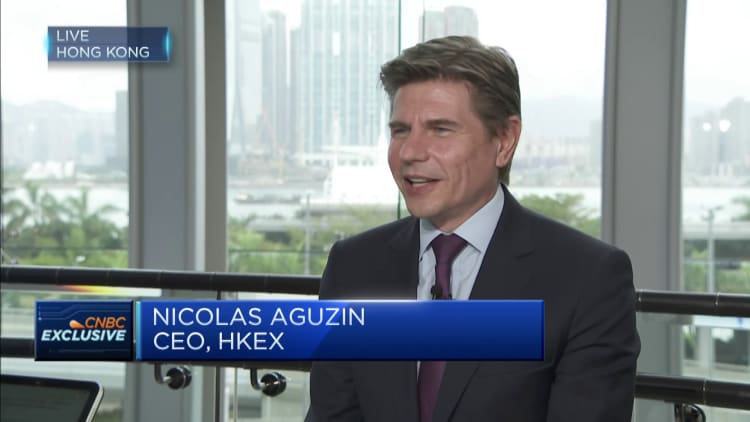

One of the world’s biggest stock exchanges has a special policy for bad weather – it halts trade whenever authorities issue a typhoon warning of Signal 8, the third highest level, or higher.
Nicolas Aguzin, the CEO of Hong Kong Exchanges and Clearing, said the bourse is “constantly” looking into reviewing this protocol that halts trade in its $3.9 trillion stock market alongside other structural issues that investors face in Hong Kong.
When asked when investors can expect to see a change in this policy, Aguzin told CNBC’s Emily Tan that evaluations are taking place. Aguzin made his remarks just hours before another typhoon warning triggered an early end to Wednesday’s trading session.
The Hong Kong Observatory has issued a Signal 8 or higher a total of six times in 2022, twice in 2021, and four times in 2020.
“We’re always looking at how we can enhance the microstructure of our markets, to make sure that investors can participate all the time,” Aguzin said. “You can be assured that we’re always looking into this.”
What we’re focusing on is the resiliency of Hong Kong – Hong Kong has proven time and time again that it can come back.
He added that trading policies have shifted in the past, such as changes to holiday trading. The bourse launched its derivatives holiday trading service in May after consideration of “market feedback and market readiness.”
“We have to balance the interest of the people, the security of the people, safety of the people,” Aguzin said, adding that the bourse is “always evaluating” how to make Hong Kong a top global market.
Shortly following the interview, the Hong Kong Stock Exchange suspended trade after the H.K. Observatory issued a Tropical Cyclone Warning Signal No. 8.
“There will be no Closing Auction Session for that trading day if trading has not been resumed by 3:45 pm (for full day trading) or 11:45 am (for half day trading),” the notice says. HKEX confirmed there will not be extended trading Wednesday.
Aguzin said he believes in Hong Kong’s resiliency against many challenges, including the latest typhoon hitting the city, global inflation, as well as geopolitical concerns.
“What we’re focusing on is the resiliency of Hong Kong – Hong Kong has proven time and time again that it can come back.”Hong Kong has proven time and time again that it can come back,” he said. “I do believe in the long-term strength of our market and the special fundamentals that Hong Kong has as an international financial center.”
Revised listing rules
The Hong Kong Stock Exchange in a recent consultation paper outlined proposals for a new listing regime for special technology companies which would ease requirements for listing in the city.
The revisions include a lower threshold of revenue for commercialized firms in certain sectors, including next-generation information technology and advanced materials. Companies would need to reach a valuation of $250 million Hong Kong dollars, lower than the current requirement of HK$500 million.
When asked if the bourse is prioritizing quantity over quality in its bid to attract more listings to the city, Aguzin said he sees potential in investing in these companies.
“What we’re trying to do is address high-quality companies that have great products,” Aguzin said. “Their cash flows are going to be further in the future, but their opportunities for investors are outstanding.”
Aguzin added that the recently proposed measures are expected to be solidified and formally announced “hopefully not too far from now.”
